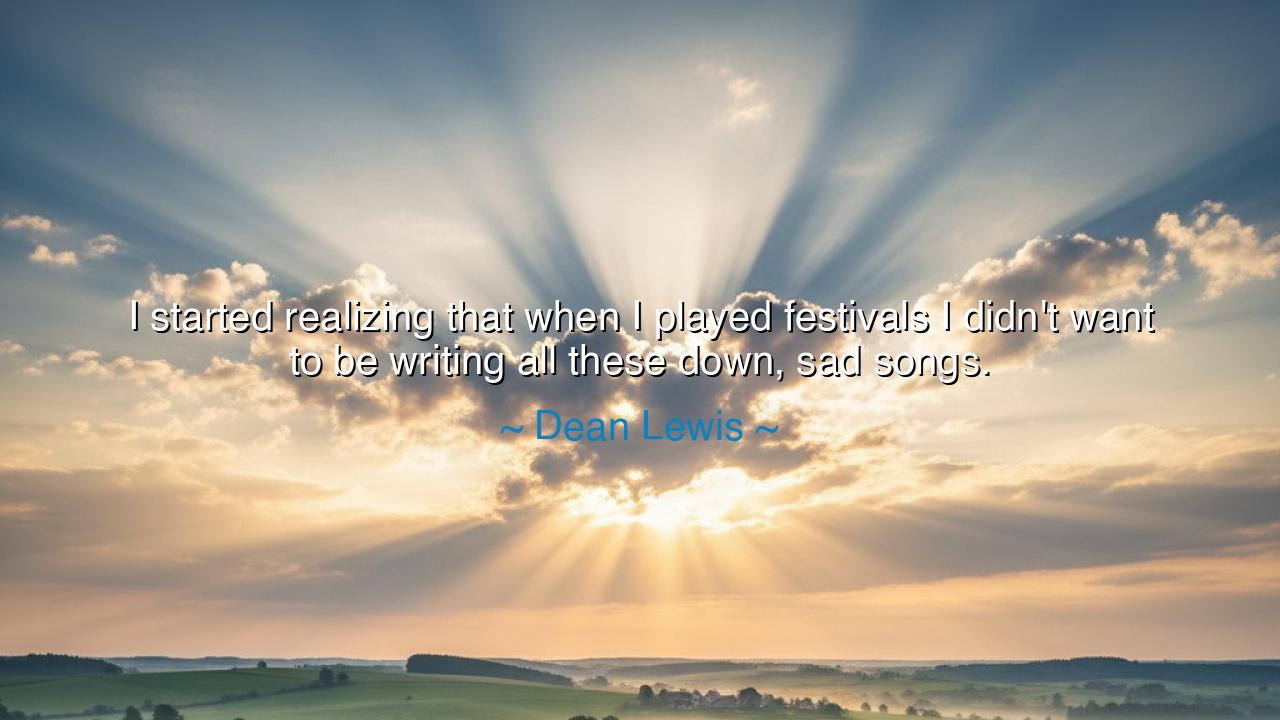
I started realizing that when I played festivals I didn't want to
I started realizing that when I played festivals I didn't want to be writing all these down, sad songs.






There is quiet wisdom in the words of Dean Lewis, who said, “I started realizing that when I played festivals I didn’t want to be writing all these down, sad songs.” In this simple reflection, we hear not only the journey of an artist but the awakening of a soul — one who has learned that creation must evolve as the spirit evolves. Beneath his statement lies the timeless human struggle between sorrow and joy, between expression and renewal. To stop writing “sad songs” is not to deny pain, but to seek balance — to choose the sunlight after years of living under rain.
In the origin of this quote lies Lewis’s own evolution as a songwriter. Known first for heartbreak ballads and melancholy lyrics, he became the voice for those who grieved quietly behind closed doors. Yet, as he began performing at festivals — places filled with movement, laughter, and communal energy — he felt the weight of contrast. He saw that his art had to grow beyond sadness, that to reach others he must first lift himself. Like many before him, he realized that art rooted only in sorrow can become a cage. To step into joy, then, was not betrayal of authenticity — it was an act of courage.
The ancients too understood this rhythm between sorrow and renewal. The poet Homer wrote of Odysseus, who wept upon hearing songs of his own suffering — yet still rose to dance when the music changed. The Greeks saw art as medicine: the tragedy to purge the heart, and the festival to restore it. So when Dean Lewis speaks of leaving behind his “sad songs,” he joins that ancient lineage of artists who learned that creation must serve not only reflection, but restoration. The soul cannot dwell forever in lament without losing its ability to hope.
There is also deep humility in his words. For to recognize the limits of sorrow is itself an awakening. Many artists grow addicted to melancholy, believing that only pain produces truth. But Lewis’s realization reveals another truth — that light can be just as profound as shadow. It takes maturity to understand that joy, too, carries wisdom; that laughter, too, can be holy. When one learns to create from healing rather than from hurt, art becomes not only an echo of the past but a beacon for the future.
Consider the example of Vincent van Gogh, whose paintings were born from anguish. In his early years, his work was dark and heavy, filled with browns and blacks. Yet when he moved to the south of France and let the sun touch his soul, his palette changed — yellow, gold, blue. His pain did not vanish, but he found a way to transform it into radiance. His art became not a cry, but a revelation. Dean Lewis’s desire to move away from “sad songs” mirrors that same transformation — the artist choosing to turn pain into light rather than merely reflect it.
The sadness in Lewis’s early music was never false; it was a mirror of truth. But to stay forever in sadness is to lose one’s capacity for rebirth. Life, like music, demands movement — crescendos, silences, refrains. The festivals became a symbol for him: the dance of life calling him back from the solitude of melancholy. His shift was not rejection, but redemption — the return of a voice that has cried long enough and now seeks to sing.
The lesson, my children, is one of transformation. Pain has its purpose; it softens the heart and deepens understanding. But you must not let sorrow become your only song. When you have learned its lesson, rise. Seek the joy that gives balance to your humanity. Create not only from what broke you, but from what healed you. The artist’s truest duty is not to dwell in the darkness, but to illuminate it.
So when you hear Dean Lewis’s words, remember: the time will come when you must lay down your sad songs too. The time will come to lift your face toward the sun, to write of hope, of laughter, of gratitude. For the soul that learns to sing again after sorrow — that soul becomes the living proof that light is always waiting, even at the edge of loss.






AAdministratorAdministrator
Welcome, honored guests. Please leave a comment, we will respond soon